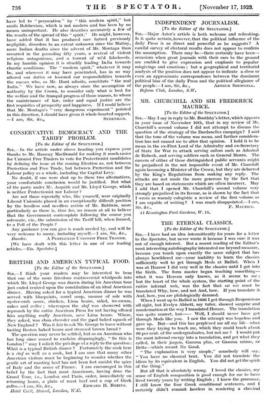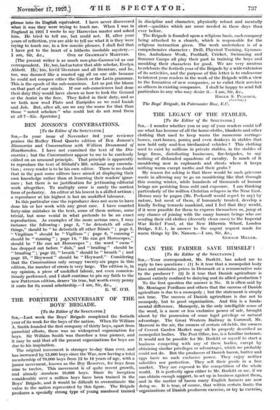THE ETERNAL CLASSICS.
[To the Editor of the SPECTATOR.] SIR,—I have had an idea intermittently for years for a letter to the Spectator, but never wrote it because I was sure it was not of enough interest. But a recent reading of the Editor's most interesting autobiography interested me beyond measure, because you touch upon exactly the same subject that has always bewildered me—your inability to learn the classics sufficiently well to get through Mods at Banjo'. When I was at Harrow I did very well in the classics until I got into the Sixth. The form master began teaching something— what it was Heaven only knows, as it seems to me ; but the heart of the whole system, the starting point of the entire infernal web, was the fact that Kai 7T6s. must be translated Why, how, and not And, how. If you translate it And, how, you are philologically damned.
When I went up to Balliol in 1896 I got through Responsions all right, but Evelyn Abbott, my tutor, showed surprise and consternation at the way I translated Horace. The translation was quite correct, but— Well, I should never have got through Mods like you. I saw the attempt was hopeless and gave up. But—and this has perplexed me all my life—what were they trying to teach me, which they could teach about 90 per cent. of the undergraduates, but not me ? I. would put the most infernal energy into a translation, and get what they called, in their jargon, Gamma plus, or Gamma minus, or Delta—which .meant No Good.
"The explanation is very simple," somebody will say. "You have no classical bent. You did not translate the idiom by its equivalent in English. You did not get the spirit of the thing."
But all that is absolutely wrong. I loved the classics, my sense of English composition is good enough for me to. have lived twenty years by writing English ; I knew the grammar, I still know the four Greek conditional sentences, and I certainly didn't commit howlers in rendering a classical
phrase into its ERglish equivalent. I have never discovered what it was they were trying to teach me. When I was in England in 1921 I wrote to my Harrovian master and asked him. He tried to tell me, but 'could not. If, after your years of reflection, you are able to tell me what it is they were trying to teach me, in a few eonciie phrases, I shall feel that I have got to the heart of n hitherto insoluble mystery.— I am, Sir, &c., ' ONE OF GRAMMAR'S MARTYRS.
[The present writer is as much non-plus-Gamma'ed as our correspondent.. He,too, had as tutor that able scholar, Evelyn Abbott. He,'-too; leVed "literature and all literature, and he, too, was damned like a roasted egg all on one side because he could not conquer either the Greek or the Latin grammar. This is the epoch of the sub-conscious. Let us put the blame on that part of our Minds: If our sub-consciences had done their duty theY.would have shown us how to look the Gerund
or the Aorist in the face. They failed in their duty, and so we both now read Plato and Euripides as we read Isaiah and Job. But, after all, are we any the worse for that than those "noted scholars" who could but do not read them
at all Spectator.]



























































 Previous page
Previous page